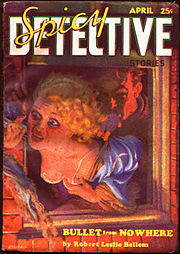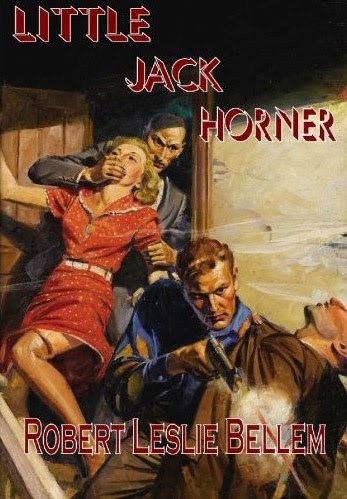Mr Slang shines a light on another hero of slang, this time from the world of pulp fiction…
I reached for the doorknob of Linda LaMarre’s dressing room. Before I could turn it I heard a gurgling screech from inside, followed by a heavy thud. I yanked the portal open, catapulted over the threshold. Then I froze as I lamped the gorgeous LaMarre cupcake writhing on the floor. Her squirms reminded me of a gaffed eel on a hot rock. I knew she was a goner the instant I hung the focus on her glazing glims, her bluish-purple mush, her protruding tongue. A guy doesn’t have to be a doctor to recognize the symptoms of suffocation. The quail on the carpet was obviously passing to her reward; and not from natural causes, either.
Robert Leslie Bellem ‘Dead Heat’ Hollywood Detective (January 1944)
He was born in 1896. Or maybe 1904. He died in 1968 but so did Steinbeck and Upton Sinclair not to mention Kennedy and King, and who was going to notice? He was called Robert Leslie Bellem but if there was a cheque on offer he’d answer to Ellery Watson Calder, Harley L. Court, Walt Bruce, John Grange, Nelson Kent, Kenneth A. Nelson, Jerome Severs Perry and Harcourt Weems. He wrote a million words a year, around 3000 stories in all, plus maybe 70 comic book scripts and when all that was through he moved into TV. There were even a pair of novels, but what he did best was pulp. He wrote for something called Culture Publications who specialized in ‘spicy’ titles which, by mid-century standards meant sexy: Spicy Detective, Spicy Adventure, Spicy Western and Spicy Mystery. He had various series characters but the one the readers loved was Dan Turner. The private dick. Bellem launched Turner in Spicy Detective with ‘Murder By Proxy’ in 1934 and finished off with ‘Murder Wears Makeup’ sixteen years later. There was a lot of murder in the titles. That and ‘death’, ‘corpse’, killer’, and ‘bump-off’. Art it wasn’t. Turner moved on: in 1942 Bellem quit the Spicy stable and gave him a mag of his own: Dan Turner, Hollywood Detective. Then dropped the moniker and made it Hollywood Detective. They all sold.
 We know pulps. The opposite of slicks. Wood-pulp stock, lurid covers and geared for working-class men instead of something shiny aimed at middle-class women. All day-dreams. Paradoxically the pulps at 25¢ a pop were pricier; something to do with economies of scale. Born in the Twenties, reached their peak in the Thirties and Forties, and screwed in the Fifties, like much else in US popular culture, by the new juggernaut: TV. A theme for every market so long as it was down: military pulps, scifi pulps, mystery pulps, adventure pulps, sports pulps, western pulps, softcore pulps and crime and detective pulps. Hammett started there, on Black Mask (which, at least for a while, what was what H.L. Mencken edited when he wasn’t running The Smart Set or writing The American Language); Chandler too, and a whole bunch of others. But those two were the big boys and when they could they quit the pulps and started on novels and movies and as the best of breed were allowed to qualify as literature.
We know pulps. The opposite of slicks. Wood-pulp stock, lurid covers and geared for working-class men instead of something shiny aimed at middle-class women. All day-dreams. Paradoxically the pulps at 25¢ a pop were pricier; something to do with economies of scale. Born in the Twenties, reached their peak in the Thirties and Forties, and screwed in the Fifties, like much else in US popular culture, by the new juggernaut: TV. A theme for every market so long as it was down: military pulps, scifi pulps, mystery pulps, adventure pulps, sports pulps, western pulps, softcore pulps and crime and detective pulps. Hammett started there, on Black Mask (which, at least for a while, what was what H.L. Mencken edited when he wasn’t running The Smart Set or writing The American Language); Chandler too, and a whole bunch of others. But those two were the big boys and when they could they quit the pulps and started on novels and movies and as the best of breed were allowed to qualify as literature.
Most didn’t. And didn’t want to. Most hacks were more like Bellem, or Joe Archibald, who knocked out tales of his hen-pecked sad sack PI Willie Klump the bumbling ‘president of the Hawkeye Detective Agency.’ Still, Archibald, another who could knock it out week after week, made a living. The public seemed insatiable. You could parlay one word a dozen ways and slap them each on a cover: All Detective, Crack Detective, Double-Action Detective, Detective Fiction Weekly, Headquarters Detective, Lone Wolf Detetctive, Romantic Detective, Sure-Fire Detetctive, Ten Detective Aces, Thrilling Detective, Vice Squad Detective.
Between them they put together a new star: the hard-boiled dick. The eye. The shamus. The private operator. Superstars like Hammett’s Continental Op and Chandler’s Philip Marlowe, and near-peers (but never quite near enough) like Flashgun Casey (George Harmon Coxe) or Race Williams (Carroll John Daley). The public couldn’t get enough. Voyeurs really, reading the pulps, watching the movies: Public Enemy, White Heat, Scarface and the rest, usually products of the Warners Brothers lot. Guns, girls, glamour and what the mob, at least on pulp paper, would call geetus which was money. The underworld, as ever, looked a lot sexier than the daily grind. One pulp title billed itself as Racket and Gangster Stories. No-one bitched. The penny-a-liners just had to remember to toss in a moral ending.
Bellem took it to the limit. Slang in excelsis. Synonyms like a thesaurus. Tough guy: tough terminology. Looking back, maybe he was parodying the whole form. You weren’t an investigator but a private dick, pry, skulk or snoop. You met women, had women (none of Chandler’s ‘erotic as a stallion’ for Dan: no limp-wristed gazooks, jessies or she-males invited to his spartan shebang). But you called them cookies, cupcakes, muffins, patooties, twists, wrens, frails, tails and quails. You worked for money, which was cabbage, greenery, salad, iron men, spondulicks, moola and ducats. Guns were cannons, gats, rodneys, peashooters, roscoes and equalizers. Guns that didn’t shoot, but burned, cracked, whopped¸ coughed and yapped. And didn’t kill but biffed, blipped, bopped, belted, browned, bumped and butched and that’s just the Bs. Then the flatheads, gendarmes, harness bulls and slewfoots came in and if you’d left the ginzos, grifters, bimbos, slugs and jibones alive, took them off to the bastille, the slammer or the big house. Later, when they got the juice, they’d cook in the smokehouse.
S.J. Perelman, who penned scripts for the Marx Brothers and called his journalism feuilletons, wrote up Turner for the New Yorker . Bellem’s boy was ‘the apotheosis of all private detectives’. He also mentioned ‘the steely automatic and the frilly pantie’ which was more like it, even if he prefaced them by another three-dollar tongue-twister: ‘juxtaposed’. Either way he mentioned that they paid. Bellem kept on typing.
Somewhere a roscoe coughed. Ka-pow!!!













My dad calls money ‘spondulicks’. Any idea of the etymology?… V strange word.
The great Eric Partridge suggests a derivation from Greek spondulos, a type of shell once used as currency. If this is right, the term would presumably be a piece of old-fashioned public school argot?
There is more discussion on Michael Quinton’s World Wide Words blog here:
http://www.worldwidewords.org/weirdwords/ww-spo1.htm
Spot on JL, though I might, were chance to permit it, like to chatter about E Partridge one day. I don’t think it was public school argot, however, since the earliest uses are all American (and even they have no links to school or college.)
All I can add is add a very early use (and a few synonyms) from the San Francisco Call of 26 Mar. 1857.: To ‘fight the tiger’ was to play at faro, a notoriously bent game of pretty much anything but chance.
[He] Went to fight the furious tiger,
Went to fight the beast at faro,
And was cleaned out so completely
That he lost his every mopus.
Every single speck of pewter,
Every solitary shiner,
Every brad and every dollar.
All the dough in his possession,
All the spoons his labour earned him,
All the bright and lively ready,
All the rowdy, all the stumpy.
All the cash, and all the rhino,
All the tin he did inherit.
All the dibs he did discover.
All the browns his uncle lent him.
All the chips and dust and clinkers,
All the dimes and all the horse-nails,
All the brass and all the needful,
All the spondulix and buttons.
Cracking post.
“…a gaffed eel on a hot rock” is pretty good, isn’t it?
a very fine post, I am sure James Ellroy is taking notes!! I like “patooties”
Brilliant, JG!